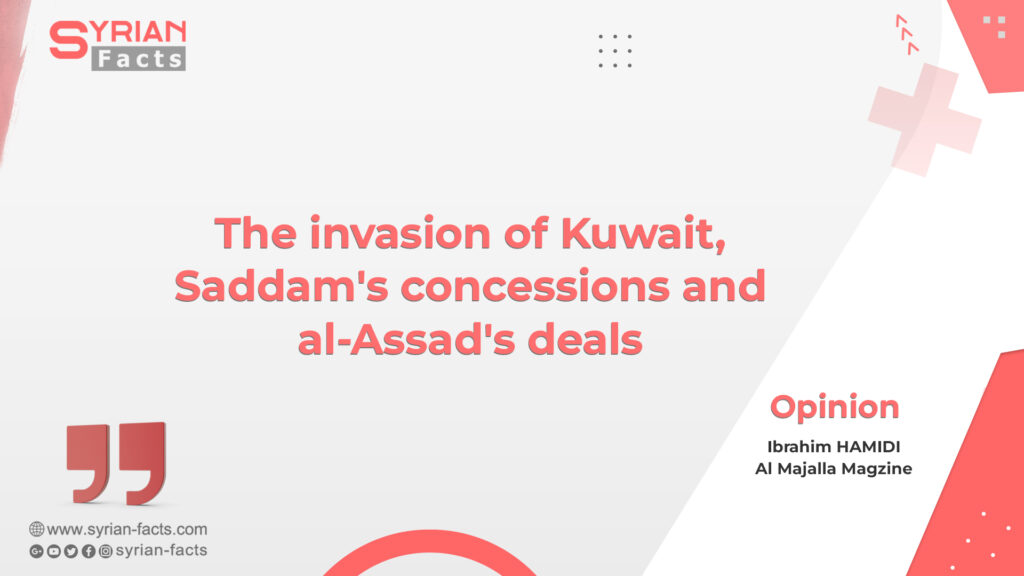It has been 33 years since Saddam Hussein’s invasion of Kuwait, and while much has changed over the past three decades, the impact of this “Saddamist” adventure continues to resonate in Iraq, the region, and the world.
Most significantly, the Kuwaiti people still carry the memories of pain from the invasion, alongside the hope instilled by the solidarity and support of brotherly countries, spearheaded by Saudi Arabia, that came to liberate their nation.
In this August issue of Al Majalla, we present a comprehensive analysis of the aftermath of Saddam’s invasion. The first two articles, authored by Kuwaiti writers, thoroughly map the scene from all angles, exploring the profound psychological dimension left on the Kuwaiti people due to the invasion.
Additionally, they delve into the missed opportunities and prospects for a new Kuwait, one that transcends the ordeal of the past three decades and embraces the rapid advancements unfolding in its Gulf surroundings.
Saddam concessions to Iran revealed
Coinciding with this commemorative occasion, Al Majalla publishes confidential documents and messages exchanged between Saddam Hussein and Iranian “Supreme Leader” Ali Khamenei and President Hashemi Rafsanjani. These documents shed light on massive concessions made by Saddam to Iran — a nation he had fought against for eight long years.
Of notable interest is the role played by Yasser Arafat, the head of the Palestine Liberation Organisation, who acted as a mediator between Saddam and Khamenei and subsequently allied with the Iraqi president in the war—a position that came at a cost for the Palestinians.
Al-Assad-Bush exchanges published
Al Majalla also publishes messages exchanged between Hafez al-Assad and t George H.W. Bush to eliminate the Syrian president’s rivals in Lebanon —General Michel Aoun, and the leader of the Lebanese Forces, Samir Geagea.
The exchange reveals the Syrian army’s participation in a military campaign that eliminated Aoun on 13 October 1990 and “neutralised” Geagea before his subsequent imprisonment in 1994. These were two “gifts” from Bush to al-Assad that freed his hands in Lebanon and saved him from losing his Soviet ally.
The pair met later in November 1990, leading to al-Assad’s participation in the Desert Storm operation to expel Iraq from Kuwait at the beginning of 1991.
American presence: Then and now
The cover story examines Saudi Arabia’s leading role in the Gulf as well as America’s presence, which massively expanded after the war. It compares this to the changing current American priorities, which are more focused on its competition with China.
However, former US ambassador Robert Ford insists that the essence of the American presence will not change and that Washington is still keen not to allow a vacuum in the Gulf to be filled by China or exploited by Iran.
The article also reviews the extremist organisations that took advantage of the war, starting with al-Qaeda and ending with the Islamic State (IS) and its affiliates, which thrived through crises, and the challenges they pose in the region and the world.
Al Majalla dives into its archives to republish distinguished coverage of the war, including a special report on a secret session of the Kuwaiti cabinet in which the government discussed the possibilities of an Iraqi invasion.
It also reviews former Iraqi politicians’ ambitions in Kuwait, focusing in particular on the threats of Abdul Karim Qasim 29 years before the “historic sin.”
Focus on Europe and BRICS
The upcoming August edition of Al Majalla explores several critical global issues that are reshaping the continent of Europe and the dynamics of power in the world.
One of the main topics covered is the rise of the European right, which poses a significant challenge to the continent’s distinct identity. Al Majalla delves into the reasons behind this trend and its implications for European societies.
Additionally, the August issue sheds light on the “Southern Alliance,” a group comprising emerging powers and blocs on the world stage. A special focus is dedicated to BRICS, the influential alliance of major countries challenging the dominance of the United States and its allies.
With the next BRICS summit scheduled to take place in South Africa, Al Majalla explores the alliance’s growing influence and potential impact on global affairs.
The issue features an in-depth profile of Indian Prime Minister Narendra Modi, whose journey from being a humble tea seller to a decision-maker in the world’s most populous country is both inspiring and transformative. It highlights India’s ascent as a prominent player in global governance, offering an alternative to the dominance of American unilateralism.
Al Majalla presents an interview with Abdullah Al-Dardari, the Assistant Secretary-General of the United Nations, who discusses the numerous crises afflicting the world today. The focus is on the fragile Arab region, which acknowledges its own vulnerabilities, as Dardari explains.
AI applications in the Arab world and much more
In the realm of technology, Al Majalla covers the United Nations Development Programme’s plans to utilise artificial intelligence for analysing crises in the Arab region and their interrelationships. This innovative, as Dardari elaborates, approach aims to gain deeper insights into the challenges faced by the region and find effective solutions.
Furthermore, the issue includes a comprehensive report on the sixth generation of communications technology, exploring its impact on the Internet and robotics. This analysis provides readers with a glimpse into the future of communication and how it will influence various aspects of modern life.
In the realm of culture, critic and writer Khalida Saeed makes her Al Majalla debut. In her enriching contributions, Saeed explores her personal connection to reading and writing, delves into the essence of poetry and its significance, and reflects on how every text is a culmination of various readings and interpretations.
Moreover, the August issue of Al Majalla presents an exclusive interview with Mexican writer David Toscana, who shares his thoughts and feelings after being awarded the prestigious Mario Vargas Llosa Prize.
A selection of the top 10 books that delve into the history of the “Expo” is also featured. With Riyadh having submitted its bid to host the Expo in 2030, this issue delves into the significance and impact of these international exhibitions.
Addressing pressing environmental concerns, the issue provides a platform for Iraqi intellectuals to discuss climate change as an “existential threat” to their country. Through their insights, readers gain a deeper understanding of the challenges Iraq faces in the context of global climate issues.
Al Majalla concludes with a compelling piece from Algerian novelist Samir Kosseimi, who shares his thoughts on “The Deficient Identity.” His writing sheds light on complex issues related to identity and self-discovery.
Al Majalla Magzine









Be the first to write a comment.